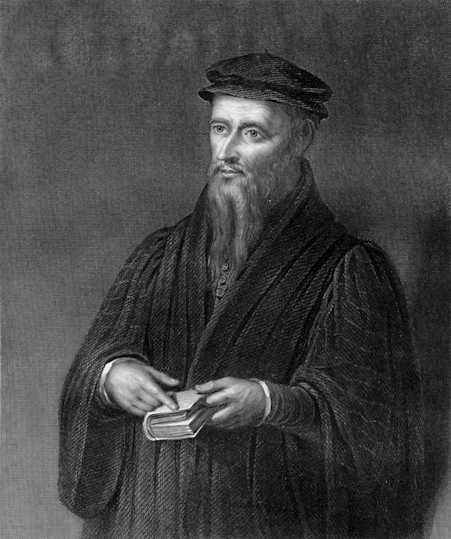|
William Farel (1489-1565AD)
Engraving by William Holl 1847AD, from a drawing by W. Bonnar, R.S.A.,from a rare print by Hondius.
French Protestant Reformer & Evangelist William Farel. (117k) by Philip Schaff from his History of Christianity (1893AD edition) pdf (44k) zip (25k) Life of William Farel, the Swiss Reformer. (792k) by Rev. Melchoir Kirchhofer, (translated from the German,) 1837AD.
WILLIAM FAREL, (1489-1565AD), French evangelist, was born of a noble family near Gap, Dauphiné. He studied in Paris under Jacobus Faber (Stapulensis), on whose recommendation he was appointed professor in the college of Cardinal Lemoine. In 1521, on the invitation of Bishop Briçonnet, he went to Meaux, and took part in efforts of reform within the Roman communion. The persecuting measures of 1523, from which Faber found a refuge at Meaux, determined Farel to leave France. Oecolampadius welcomed him to Basel, where in 1524 he put forth thirteen theses sharply criticizing Roman doctrine, and defended them with so much vehemence that Erasmus joined in demanding his expulsion from the city. He thought of going to Wittenberg, but his first halt was at Strassburg, where Bucer and Capito received him kindly. At the call of Duke Ulrich of Württemberg he went as preacher to Montbéliard, but was forced to leave early in 1525. Retracing his steps to Strassburg and Basel, at the end of 1526 he obtained a preacher’s post at Aigle, then a dependency of Bern, and, with reference to his protection by that city, adopted the pseudonym Ursinus. He obtained in 1528 a licence from the authorities to preach anywhere within the canton of Bern, but extended his labours to the cantons of Neuchâtel and Vaud. In October 1530, breaking into the church of Neuchâtel with a crowd who destroyed the idols they believed dishonoured the worship of God. In 1532 he visited the Waldenses and on the return journey halted at Geneva, then at a crisis of political and religious strife. On June 30, 1532, the Council of Two Hundred had ordained that in every church and cloister of the city “the pure Gospel” should be preached. Against this order the Roman Catholic bishop’s vicar led the opposition. Reaching Geneva in October 1532, Farel at once began to preach at his lodging, and soon attracted crowds. Summoned before the bishop’s vicar, he was violently thrust from the court and bidden to leave the city within three hours. He escaped with difficulty to Orbe by boat. Through the intervention of the government of Bern, liberty of worship was granted on March 28, 1533 to the Reformation party in Geneva. Farel, returning, achieved in a couple of years a complete supremacy for his followers. On New Year’s Day 1534 the bishop interdicted all preaching unauthorized by himself, and ordered the burning of all Protestant Bibles. This was the signal for public disputations in which Farel took the leading part, with the result that by decree of August 27, 1535, the "mass" was suppressed and the reformed religion established. Calvin, escaping from France, and on his way to Basel for a life of study, stopped at Geneva, and by the vehement importunity of Farel was called to establish the Protestant reformation there. The disciplinary measures that were introduced brought about a political reaction under which Farel and Calvin were banished in 1538. Farel was then called to Neuchâtel in July of that year, but his position there was made untenable, though he remained at his post during a visitation of the plague. Farel’s indomitable faith and courage through adversity was never better shown than at this crucial period as he cared for the sick and dying. Eventually in 1541, as political circumstances had favourably changed in Geneva, Calvin was recalled there to introduce his Protestant reforms. Farel also returned to join him. Leaving Geneva to Calvin, in 1542 Farel went to Metz to support the Reformation there. In 1544 he returned to Neuchâtel and ministered there as a pastor. He married late in life (in his 70s) much to Calvin’s disappointment, but they remained the closest of friends to the end. No one was more frequently and confidentially consulted by Calvin. Calvin's early death, in 1564, deeply affected Farel. He died at Metz a year later on September 13. Without the Lord sending out Farel the great work of Calvin could not have been done.
|
||||||||||||||||||||||||
|
|
